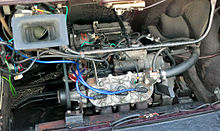List of Suzuki engines
This is a list of automobile engines developed and sold by the Suzuki Motor Corporation. Suzuki is unusual in never having made a pushrod automobile engine, and in having depended on two-strokes for longer than most. Their first four-stroke engine was the SOHC F8A, which appeared in 1977. Suzuki continued to offer a two-stroke engine in an automotive application for a considerably longer time than any other Japanese manufacturer.
Straight twins
Suzulight SF Series
360.88 cc (22.022 cu in) air-cooled 2-stroke, 59 mm × 66 mm (2.32 in × 2.60 in) bore × stroke (downsleeved copy of Lloyd LP400 engine)
- 1955–1959 Suzulight SF
- 1959–1963 Suzulight 360TL / Van 360 (TL)
- 1962–1963 Suzulight Fronte TLA
FB Series
- 1961–1972 – Suzuki FB engine – air-cooled 359 cc
- 1963–1969 – Suzuki FE/FE2 engine – air-cooled 359 cc, FF applications
- 1972–1976 – Suzuki L50 engine – water-cooled 359 cc
- 1974–1976 – Suzuki L60 engine – water-cooled 446 cc (export only)
FA/FC (prototype)
360 cc (22 cu in) 2-stroke, 64 mm × 56 mm (2.52 in × 2.20 in) bore/stroke. This prototype produced 25 bhp (19 kW) at 6000 rpm. It was fitted to a rear-engined prototype (also named FC) in 1961, as part of the development work for the LC10 Fronte.
Daihatsu's AB10
- 1977.6–1978 – Daihatsu AB10 engine – 0.55 L
E08A engine
- 2015–2020 – see Diesel engines section – 0.8 L
Three cylinders
C engine — 2-stroke
- C10 — 785 cc (47.9 cu in) 70 mm × 68 mm (2.76 in × 2.68 in)
- 1965.12–1969.10 Suzuki Fronte 800
- C20 — 1,100 cc (67.1 cu in) – 80 PS (59 kW) prototype engine for intended Suzuki Fronte 1100
LC engine

1967–1977 – Suzuki LC engine – 0.36–0.48 L
FB engine
1975–1987 – FB Series – 0.54 L
Rather than being a newly developed engine, the T5 series is essentially an FB/L50 2-cylinder with a third cylinder added, its origins thus dating back to 1961.
F engine
1980–present – F engine (three-cylinder) – 0.5–0.8 L
G engine
1984–2006 – G engine (three-cylinder) 1.0 L
K engine
1994–present – K engine (three-cylinder) – 0.7–1.0 L
R engine
2011–present – 0.7 L
Four cylinders
F engine
1979–present – F engine (four-cylinder) – 0.7–1.1 L
G engine
1984–present – G engine (four-cylinder) – 1.0–1.6 L
J engine
1996–2019 – J engine (four-cylinder) – 1.8–2.4 L
K engine
1997–present – K engine (four-cylinder) – 1.0–1.5 L
M engine
1999–present – M engine– 1.3–1.8 L
E15A engine
2019–2020 – see Diesel engines section – 1.5 L
V6 engines
H engine
1994–2009 – H engine – 2.0–2.7 L
N engine
2006–2009 – N engine – 3.2–3.6 L
Diesel engines
D engine
2006–present – D engine – 1.3–2.0 L
Licensed from Fiat/FCA:
- D13A 1.3 L (1,248 cc) 4-cylinder
- Suzuki Wagon R+ (Europe)
- 2007–2013 — Suzuki SX4 sedan
- 2009–2016 — Suzuki Splash/Maruti Suzuki Ritz
- 2012–2019 — Suzuki Ertiga
- 2014–2019 — Suzuki Ciaz
- 2017–2019 — Suzuki Ignis
- 2008–2020 — Suzuki Dzire
- 2006–2020 — Suzuki Swift
- 2013–2020 — Suzuki S-Cross
- 2015–2020 — Suzuki Baleno
- 2015–2020 — Suzuki Vitara Brezza
- D16A 1.6 L (1,598 cc) 4-cylinder
- 2015–present — Suzuki SX4 S-Cross
- 2015–present — Suzuki Vitara
- D19A 1.9 L (1,910 cc) 4-cylinder
- 2006–2009 — Suzuki SX4 (Europe)
- D20A 2.0 L (1,956 cc) 4-cylinder
- 2010–2014 — Suzuki SX4 (Europe)
E engine
- E08A — 0.8 L (793 cc) 2-cylinder
- The E08A engine is a short-lived diesel engine engineered mostly for the Indian market. It is a small inline twin 4-stroke diesel engine with a bore × stroke of 77 mm × 85.1 mm (3.03 in × 3.35 in), giving 793 cc (48.4 cu in).[1] As a 360° parallel twin it features a Balance shaft located beside the crankshaft. This all aluminium engine is turbocharged and intercooled, has a 15:1 compression ratio and a DOHC cylinder head with 8 valves. Power output depends heavily on the application.
- 2015–2017 Suzuki Celerio with 35 kW (47 hp) at 3500 min−1 and 125 N⋅m (92 lbf⋅ft) at 2000 min−1.
- 2016–2020 Suzuki Super Carry (India & Philippines) with 24 kW (32 hp) at 3500 min−1 and 75 N⋅m (55 lbf⋅ft) at 2000 min−1.
- E15A — 1.5 L (1,498 cc) 4-cylinder
- 2019–2020 Suzuki Ciaz (India)
- 2019–2020 Suzuki Ertiga (India)
See also
References
- "How-to identify YOUR car, and where to find info on it". Team Swift. Retrieved April 14, 2006. [dead link]
- "Suzuki Engines". Brisbane, Australia: Suzi Auto Services. Archived from the original on 2009-09-11.
